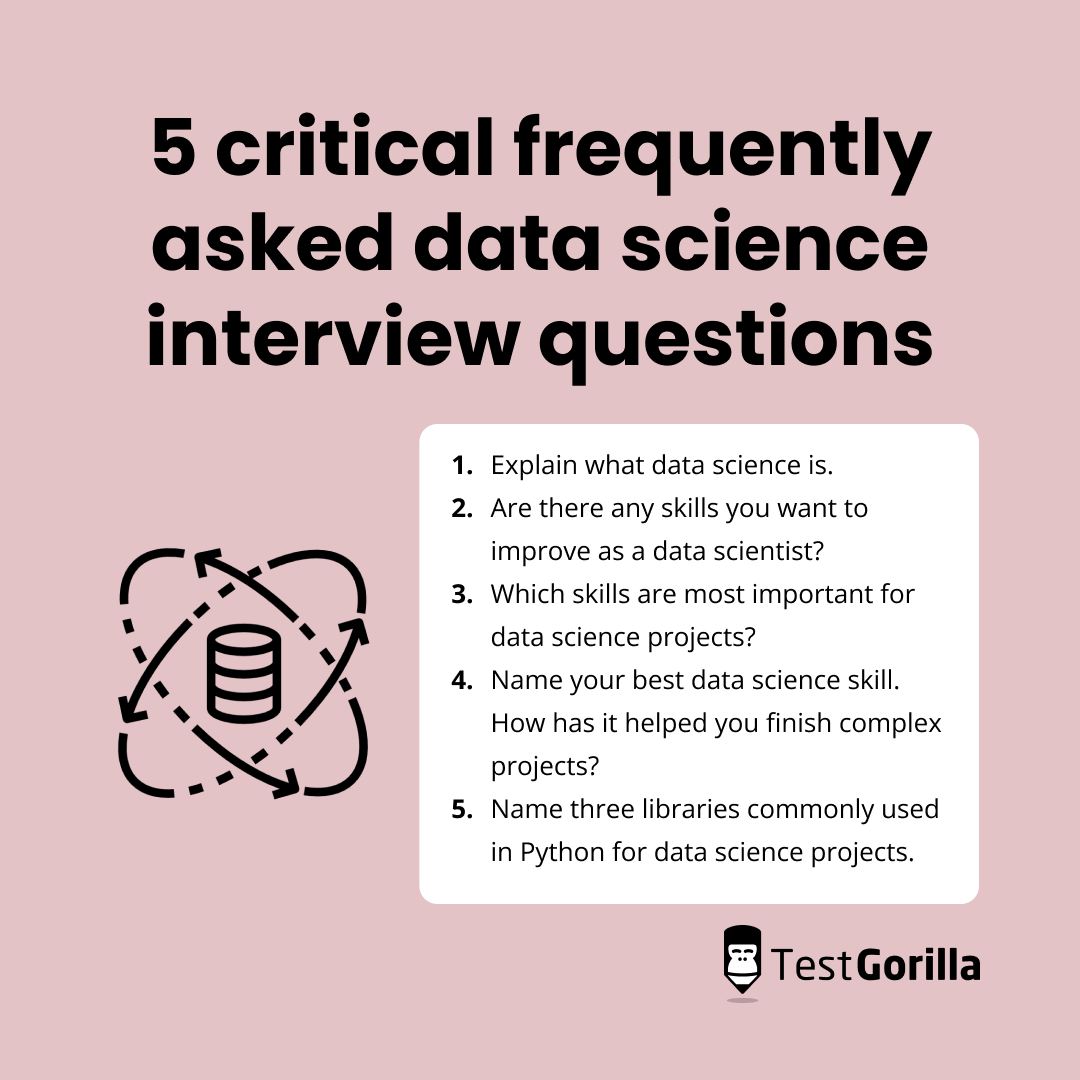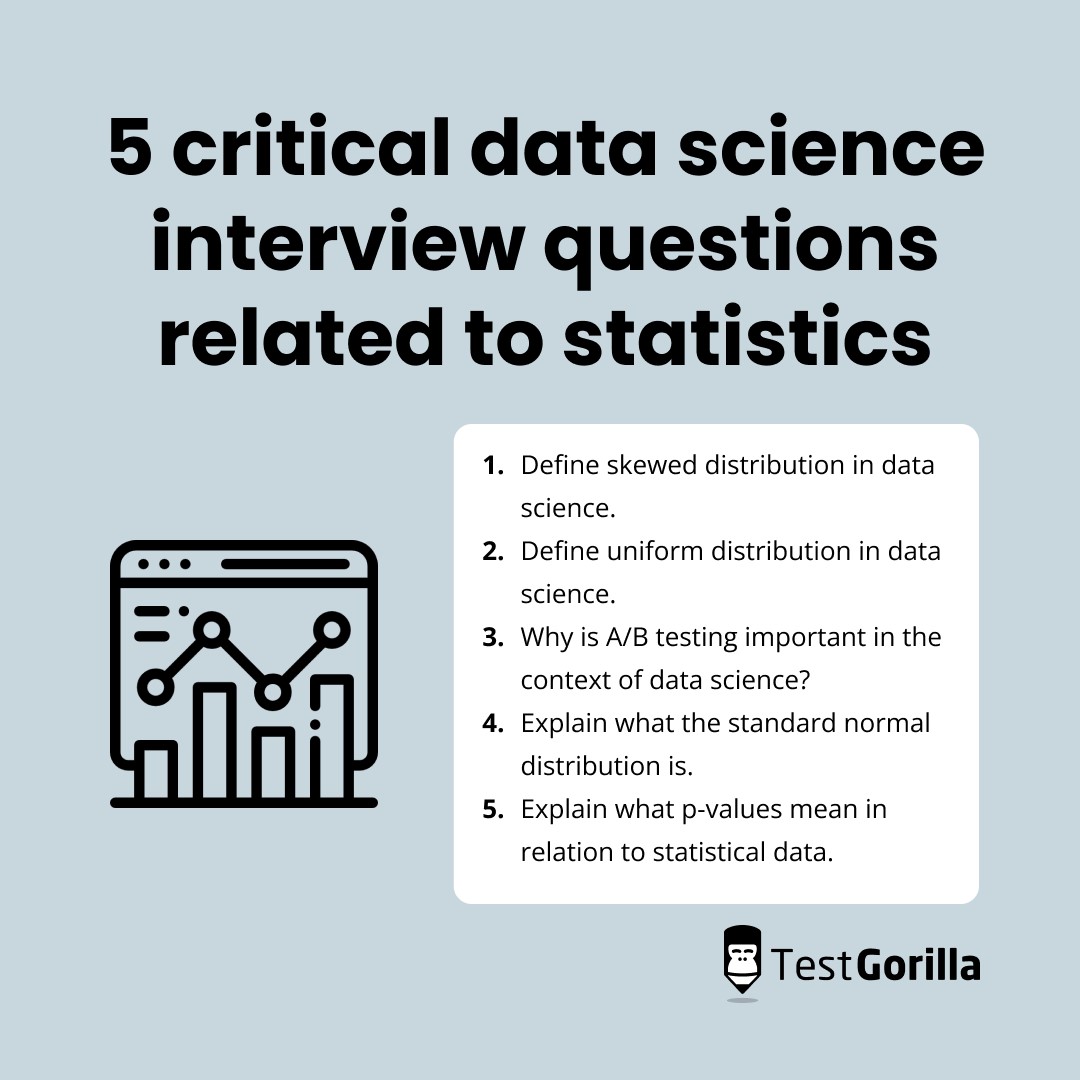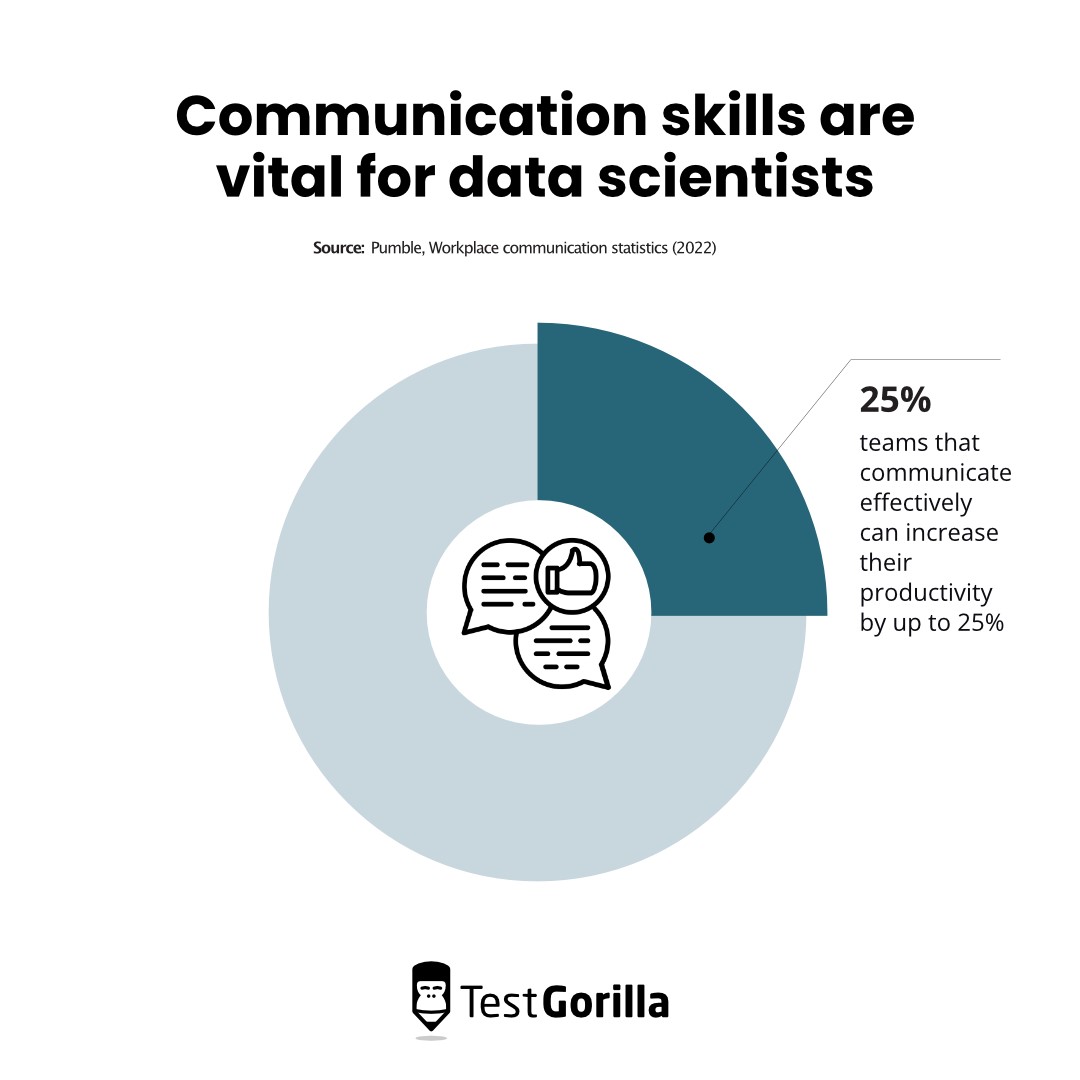The demand for skilled data scientists is incredibly high, and competition to hire skilled talent is fierce – you are up against many companies like yours, all of which are also on the hunt to find exceptional employees.
The good news is that your hiring process doesn’t have to be complex. All it takes to hire a skilled data scientist is a handy skills test, such as our Data Science test, and the right interview questions to identify the perfect candidate.
Finding the right data science interview questions can seem difficult at first, but we’ve made it easier by providing 100 questions in this article. Keep reading to choose from our top data science interview questions and incorporate them into your hiring process.
Table of contents
- 20 frequently asked data science interview questions to ask professionals
- 5 critical frequently asked data science interview questions and answers
- 59 technical data science interview questions to ask experts
- 10 critical technical data science interview questions and answers
- 13 data science interview questions related to statistics
- 5 critical data science interview questions related to statistics
- 7 data science interview questions and answers related to skills
- When should you use data science interview questions during the hiring process?
- Assess data scientists using data science interview questions and skills tests
20 frequently asked data science interview questions to ask professionals
If you want to begin your interview by learning about your applicants’ general knowledge and experience, consider asking these 20 frequently asked general data science interview questions.
Explain what machine learning is.
Explain the difference between machine learning and data science.
Name an advantage of using Python for text analysis.
Describe what recommender systems do.
Explain why data cleaning is important for analysis.
What is collaborative filtering, and what is its outcome?
Explain what gradient descent means.
How are multi-label classification problems different from multi-class ones?
Outline three steps you take when completing analytics projects.
How are feature selection and feature engineering approaches different?
Explain what MLOps are.
Are there any skills you want to improve as a data scientist?
Which skills are most important for data science projects?
Name your best data science skill. How has it helped you finish complex projects?
Outline your data science career and describe your experience.
Name a challenging data science project you completed. How did you handle it?
Explain what data science is.
Explain the difference between data analytics and data science.
Differentiate between traditional application programming and data science.
Name three libraries commonly used in Python for data science projects.
5 critical frequently asked data science interview questions and answers
Ensure you check the answers to the following five frequently asked data science interview questions to evaluate your candidates’ responses.
1. Explain what data science is.
This frequently asked data science interview question is ideal for assessing your applicants’ basic data science knowledge. Candidates must understand what data science is if they aspire to become a data scientist for your team and should respond with an in-depth answer.
If your applicants have experience in the field, they may explain that data science involves using deep- and machine-learning strategies.
Nearly 106,000 data scientists are employed in the US, many of whom use these methods to predict particular outcomes with large data. Consider applicants who provide clear examples of the duties required in data science projects.
2. Are there any skills you want to improve as a data scientist?
This data science interview question is important because improving one’s skills and constantly building knowledge is crucial for data scientists.
With this question, you can identify any skills your candidates may lack and whether they want to refine their abilities. You can also determine if they’re willing to grow and develop as a professional.
Candidates may each mention different skills when responding, such as attention to detail or deep learning. It’s also a good sign if they go further and explain how they intend to improve these skills, such as by reading data science articles or books.
You can find out whether your applicant’s skill-enhancement methods are effective by using Attention to Detail or Deep Learning tests.
3. Which skills are most important for data science projects?
Many skills are important for data science projects, from an understanding of deep learning to mathematical skills to statistics and neural network knowledge. Candidates should explain why each of these skills is important. Top applicants will provide clear examples of how they use these skills in their roles.
For example, statistics knowledge can help data scientists notice trends earlier in a project, whereas machine learning can help a machine predict the next step in relation to specific data.
Assessing whether your candidates have honed skills such as machine learning requires minimal effort – simply use our Machine Learning skills test in your hiring process.
4. Name your best data science skill. How has it helped you finish complex projects?
Candidates may each name different data science skills that have helped them to complete complex projects. For example, some candidates may mention that statistics and probability are their best skills for performing statistical analyses.
It’s important to consider whether your applicants’ knowledge and skills match their responses to this interview question. So, after asking them to complete a Fundamentals of Statistics and Probability test, check whether their responses correlate with their test results.
This approach makes it easy to learn whether they have extensive experience using statistics skills and understand why they’re important.
5. Name three libraries commonly used in Python for data science projects.
Python offers data scientists access to several libraries, including Natural Language Toolkit, pandas, NumPy, and scikit-learn. Experienced talent will be able to name several features of these Python libraries and explain what types of applications they are ideal for.
For example, NumPy is ideal for data analysis. Pandas is a perfect library for data cleaning and one of the most popular libraries in Python for data analysis.
59 technical data science interview questions to ask experts
Consider these 59 technical data science interview questions to carefully examine your candidates’ technical knowledge and test their expertise.
Define and explain logistic regression.
Explain what univariate analysis is.
Define bivariate analysis and explain how it relates to data science.
Explain what multivariate analysis is.
Explain what a k-means clustering algorithm is.
Explain what long data formats are.
Define wide data formats in data science.
Outline what feature vectors are.
How do dropout methods work to regularize a deep neural network?
Explain what logistic regression is
What is normalization in data science?
What is standardization in data science?
Why is batch normalization beneficial?
What is the difference between standardization and normalization?
Explain what multicollinearity is.
How would you prevent multicollinearity?
What is the difference between extrapolating and interpolating data?
Explain what supervised learning means.
Explain what unsupervised learning means.
Define regularization in data science.
Name two methods to prevent overfitting.
Explain what data augmentation means.
Explain what feature reduction means.
What does batch gradient descent mean?
What does mini-batch gradient descent mean?
What does stochastic gradient descent mean?
How would you complete logic regression?
Name five steps required for making a decision tree.
What is a random forest model?
Which method would you use to build random forest models?
What does a wrapper method involve?
What is dimensionality reduction?
Outline some benefits of dimensionality reduction.
Explain what recommender systems are.
When is it possible to drop outlier values?
Explain what a true positive rate means.
Explain what a false positive rate means.
Explain what the ROC curve refers to.
Explain what a confusion matrix is.
Name two examples of sampling techniques.
Name one advantage of sampling.
What are eigenvalues in data science?
What are eigenvectors in data science?
Explain what root cause analysis means.
Explain what cross-validation is.
Are there any disadvantages of the linear model?
Explain what the law of large numbers refers to.
What is a confounding variable in data science?
Explain what a star schema is.
How frequently should you update an algorithm?
Explain what survivorship bias is.
Define Markov chains.
Explain what a histogram is.
Explain what a box plot is.
Explain the difference between histograms and box plots.
Explain what an error is in data science.
Explain what a residual error is in data science.
Name two differences between errors and residual errors in data science.
Explain what point estimates are.
10 critical technical data science interview questions and answers
As you assess your applicants’ responses to these technical data science interview questions, check the sample answers below for an effortless interview review process.
1. Why is batch normalization beneficial?
The following are a few notable benefits of batch normalization in data science:
The model accepts high learning rates, leading to faster model training
It’s easy to complete weight initialization tasks with batch normalization
Data scientists can use non-linear activation functions
Candidates with sufficient experience may also mention that they can simplify neural networks with batch normalization.
2. What is the difference between extrapolating and interpolating data?
Asking this question will help you determine whether your applicants have a comprehensive knowledge of variable values and how they relate to datasets. Listen for responses that clearly explain the difference between these methods.
Top candidates will explain that interpolating data involves estimating values between a variable’s known values taken from a dataset, whereas extrapolating data involves estimating values outside a variable’s range.
3. Explain what supervised learning means.
Candidates with sufficient knowledge should know that supervised learning occurs when an algorithm learns from labeled training data to predict the output. They may also explain that this type of learning is ideal for making predictions for dependent variables.
4. Explain what unsupervised learning means.
Unsupervised learning occurs when an algorithm or model isn’t supervised with training datasets.
Some examples of unsupervised learning include clustering and dimensionality reduction, which are ideal for data analysis and grouping similar data points. Make sure that your candidates can state this clearly and show their understanding and knowledge.
5. Name two examples of sampling techniques.
Data scientists with technical experience and knowledge will be able to name two sampling techniques and, crucially, explain their usefulness. Two examples they may mention include non-probability and probability sampling. Look out for applicants who can explain these techniques in the context of their recent work or projects.
6. Name two methods to prevent overfitting.
There are several methods that data scientists use to prevent overfitting. Two examples include regularization and model simplification.
Regularization avoids overfitting by adding penalties to the model’s loss function. Model simplification involves reducing a model’s complexity by removing layers or reducing neurons in deep learning models.
7. Explain what data augmentation means.
When you ask candidates this technical data science interview question, listen for responses that mention creating data samples using an existing dataset. Candidates may give the example of producing additional images in a convolutional neural network or changing images.
8. Explain what feature reduction means.
Data scientists with technical expertise should understand that feature reduction involves selecting the only key features from a data sample that may have several features. This method prevents overfitting and includes a few techniques, such as forward or backward elimination.
9. How do dropout methods work to regularize a deep neural network?
Dropout methods regularize deep neural networks by causing some architecture layers to drop out and make the network robust. The method also compels a layer’s nodes to take more or less authority for the values that a data scientist inputs. The process is beneficial because it fixes units’ layers by using other ones.
10. Explain what long data formats are.
Candidates who have worked with long data formats will have the technical knowledge to respond to this data science interview question. An ideal response will explain that datasets in long data formats have columns for different variable types and extra columns for the variables’ values.
13 data science interview questions related to statistics
Ask candidates these 13 data science interview questions to learn more about their statistics-related knowledge and experience.
Explain what p-values mean in relation to statistical data.
How would you use a Box-Cox transformation to make data normal?
Why is A/B testing important in the context of data science?
Explain what the standard normal distribution is.
Explain what a squared error is.
Explain what an absolute error is.
Explain the difference between squared and absolute errors.
Define skewed distribution in data science.
Define uniform distribution in data science.
Explain the difference between uniform and skewed distribution.
What does an R-squared value refer to?
Explain how to find the root mean square error in linear regression models.
Explain how to find the mean square error in linear regression models.
5 critical data science interview questions related to statistics
Before you check your candidates’ responses to these data science interview questions, consider the sample answers here to quickly review your applicants’ knowledge.
1. Define skewed distribution in data science.
Asking applicants this data science interview question enables you to learn about their knowledge of datasets and statistics.
When your applicant responds, consider whether they understand that skewed distribution refers to datasets that are not normalized. Listen for answers that explain that skewed distribution curves incline toward one side.
2. Define uniform distribution in data science.
Applicants keen to become your next data scientist should understand that uniform distribution is symmetrical. If they have a deep understanding of datasets, they should also be able to explain that each point of a given range in the dataset’s values has the same probability of occurrence in uniform distribution.
3. Why is A/B testing important in the context of data science?
If a data scientist wants to understand or interpret users’ experiences or preferences, they can use A/B testing to analyze and compare two product versions.
Skilled applicants may go into more detail when responding to this data science interview question by explaining that A/B testing involves presenting two product versions to users to determine which is better for the user.
4. Explain what the standard normal distribution is.
In a normal distribution, the standard deviation equals one, and the mean equals zero. Data scientists should also know that a symmetrical bell curve graph represents a standard normal distribution and that zero will be at its center.
5. Explain what p-values mean in relation to statistical data.
P-values are ideal for testing a null hypothesis’s significance in statistics. A high p-value indicates a statistically insignificant result. If a p-value equals 0.06, the chance that the experiment’s outcomes are random is 6%. A p-value lower than 0.05 indicates a statistically significant result.
7 data science interview questions and answers related to skills
Consider asking your applicants these seven data science interview questions related to skills, and review the sample answers provided to assess their responses.
1. Why is programming knowledge important for data science projects?
Data scientists should be able to easily use the correct methods to fix a query in a database using programming languages such as SQL and Python. For this reason, programming language skills are valuable assets for applicants.
If you want to learn whether your applicants have in-depth programming knowledge, use our reliable, expert-created Python and SQLite skills tests.
2. Explain how analytical skills can help data scientists complete projects.
Looking at the data isn’t the data scientists’ only responsibility. They must also use the data and analyze it closely to check for trends or patterns. Asking this question will help you dig deeper into your candidates’ knowledge related to this additional responsibility.
Skilled applicants should know that analytical skills help data scientists identify meaning in data to determine how a business is performing. Analytical skills are also one of the 10 most in-demand skills organizations want to see on candidates’ resumes.
3. Is Excel important for completing data science projects? Why or why not?
Excel may not be the optimum tool to handle complex algorithms, but data scientists may find that it makes it simpler to analyze small datasets. Therefore, applicants may explain that Excel is ideal for some data science projects and share examples of projects for which they used this tool.
In the sourcing stage, consider evaluating your candidates’ Microsoft Excel skills with an Excel skills test before you ask them this interview question.
4. How important are mathematical skills for data scientists?
Most skilled applicants will know that mathematical skills are highly important for data scientists, but the candidates to watch out for are those who understand which specific mathematical skills benefit data scientists.
Do your applicants know that standard variance and deviation, squared and absolute errors, gradient descent algorithms, and probability are all fundamental for handling algebraic and machine learning projects?
To validate whether your candidates’ responses to this interview question align with their experience, ask them to complete an Intermediate Math test or a Basic Triple-Digit Math test.
5. Why are critical-thinking skills important for data scientists?
Although analyzing and interpreting data are critical responsibilities for data scientists, they also have to question what the data represents.
The easiest way to investigate the meaning of datasets is to use critical-thinking skills and stay curious. Therefore, applicants must be able to show their critical-thinking skills and understand why these are so important for data scientists.
There are also other methods you can use to assess candidates’ responses to this question. Ask them to complete a Critical Thinking test in the talent sourcing stage. This will make it easier to establish discussion points for the interview and learn more about their skills.
6. Is problem-solving important for completing data science tasks? Why or why not?
Resolving and deciphering complex problems is one of the biggest responsibilities of a data scientist. Solving problems such as noticing the correlation between personal wealth and health quality or identifying trends in data related to geographical and health issues are everyday tasks for many in this field.
Problem-solving skills are crucial in this context – they help data scientists get to the core of an issue and even define certain problems beforehand.
Do you need an additional method to assess your candidates’ problem-solving skills? Our Problem-Solving skills test is here to help you.
7. Explain why communication skills are vital for data scientists.
Communication is an essential soft skill that data scientists use to present complex data and explain what its trends signify.
Applicants should also know that providing data-related explanations to non-technical team members is vital: teams that communicate effectively are more likely to be productive, as shown in the graphic below.
Assess candidates’ skills with a Communication test to determine whether they can use the right language for their audience and convey themselves clearly.
When should you use data science interview questions during the hiring process?
Using data science interview questions before an interview is the recommended way to assess candidates. These questions enable even non-technical HR professionals to learn if a candidate has the required skills and make a shortlist faster.
Expertise in data science isn’t required for this process – you can leave candidate evaluation to the skills assessments and completely avoid lengthy resume screening.
Skills tests are also the best method to verify what you learn about your candidates in the interview rounds by comparing their test results with the answers they give.
By using data science interview questions during the talent sourcing phase, you can also create some talking points for the interview stage based on your applicants’ knowledge. Use these interview questions after skills testing for a more efficient candidate assessment.
Assess data scientists using data science interview questions and skills tests
At first, assessing data science interview candidates may seem challenging. But with the right tools, you will have the perfect combination of methods to review your applicants’ experience and skills.
Use skills assessments to efficiently shortlist data scientists for your role. Then conduct a face-to-face or video interview, and ask our data science interview questions to learn more about them.
If you’re curious about the other skills tests we offer, visit our skills test library. You can add up to five tests to your assessment, including our Data Science test. If you want to see how our tests work, try TestGorilla for free and get full access to 10 of our most popular tests (including all personality tests).
Commit to effortless hiring – choose TestGorilla to make hiring simple.
Related posts
Hire the best candidates with TestGorilla
Create pre-employment assessments in minutes to screen candidates, save time, and hire the best talent.
Latest posts
The best advice in pre-employment testing, in your inbox.
No spam. Unsubscribe at any time.

Hire the best. No bias. No stress.
Our screening tests identify the best candidates and make your hiring decisions faster, easier, and bias-free.
Free resources
This checklist covers key features you should look for when choosing a skills testing platform
This resource will help you develop an onboarding checklist for new hires.
How to assess your candidates' attention to detail.
Learn how to get human resources certified through HRCI or SHRM.
Learn how you can improve the level of talent at your company.
Learn how CapitalT reduced hiring bias with online skills assessments.
Learn how to make the resume process more efficient and more effective.
Improve your hiring strategy with these 7 critical recruitment metrics.
Learn how Sukhi decreased time spent reviewing resumes by 83%!
Hire more efficiently with these hacks that 99% of recruiters aren't using.
Make a business case for diversity and inclusion initiatives with this data.






















